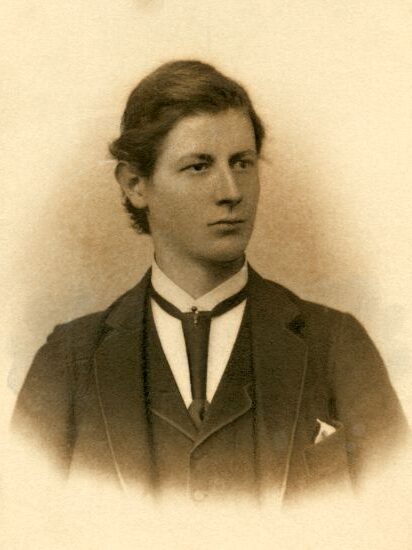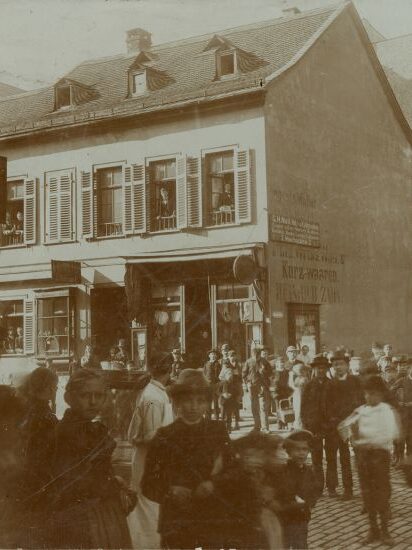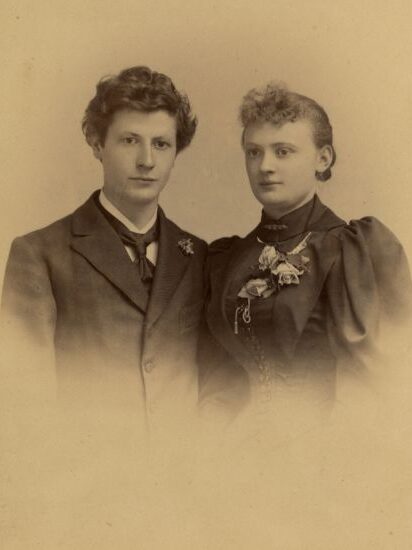Bossong, Franz
Bookseller, publisher, dialect poet, non-fiction author
Born: September 16, 1872 in Wiesbaden
died: July 11, 1914 in Wiesbaden
Bossong's childhood home, the Adam Bossong bakery at Kirchgasse 58 in Wiesbaden, founded on April 1, 1837, existed until the 1970s. From 1899 to 1909, Franz Bossong lived in Paris, then returned to Wiesbaden as a publisher. His nickname "Lord Blummekohl" alluded to his elegant appearance and suave manners. Bossong's short life - he died at the age of 42, shortly before the outbreak of the First World War in the house at Roonstraße 17 - coincided with the heyday of the so-called cosmopolitan spa town of Wiesbaden.
In 1893, Franz Bossong took over the company Keppel & Müller, Buchhandlung, Verlag und Antiquariat in Kirchgasse 45, where he had completed an apprenticeship as a bookseller after graduating from the humanistic grammar school, and expanded it to include a lithographic establishment and later also a print shop. From 1896, he continued to run the company under his own name.
In 1893, the first edition of his "Illustrirte Fremden-Führer durch Wiesbaden und Umgebung" (Illustrated tourist guide to Wiesbaden and the surrounding area) was published with his own contributions. Co-authors were Christian Spielmann, Prof. Dr. C. Meinecke, Ch. Leonhard, W. Caspari II, Dr. Maximilian Ripper, Dr. med. Emil Rosenthal and Dr. Bruno Florschütz, director of the Nassau Museum of Antiquities and Historical Research, discoverer of the Jupiter Giant Column. In the foreword, Bossong thanks his friend Ferdinand Nitzsche for the illustrations and the police councillor August Höhn, who had made his magnificent collection of old Wiesbaden engravings, books and views available to him. The booklet went through four editions between 1893 and 1897, the fourth of which reached its 16th thousandth edition.
In 1894, Bossong published the book "Gelunge Gescherr - eine Sammlung heiterer Gedichte und Geschichten in wiesbadener, frankfurter, pfälzer, westerwälder und hessischer Mundart", and in 1896 "E' Virreche in Berlin unn uff de berliner Gewerbeausstellung" was published. In the same year, he published his "Gedichte in Wiesbadener Mundart" for the first time, which went through three editions by 1909.
The satirical newspaper "Die Wäsch-Bitt" with the subtitle "E' Fach-, Lach- und Krach-Blättche"(Wäsch-Bitt) was published in three volumes from 1897 to 1900 by Wiesbaden publisher Franz Bossongs. He wrote most of the articles himself and edited the others. Bossong was a member of the Sprudel carnival club and, in the guise of "Virreche", a popular carnival speaker (Fastnacht).
As a member and one of the secretaries of the trade association for Nassau and chairman of the Wiesbaden Commercial Association, Bossong was committed to representing the interests of Wiesbaden's business people. Politically, he was close to the Liberal Party.
He was also chairman of the Wiesbaden Deaf and Dumb Association and president of the Rhenish Deaf and Dumb Association. In 1892, his treatise "Der Kampf der Taubstummen um die Laut- und Gebärdensprache" (The struggle of the deaf and dumb for spoken and sign language) was published by Keppel & Müller. Here he took sides with the deaf-mutes, who were in danger of becoming victims of a dispute between pedagogical doctrines about the methods of spoken and sign language.
In 1895, Franz Bossong married Josephine Pauline (Phina) Steiger, daughter of the stove manufacturer Georg Michael Steiger. Their son Franz Bossong junior was born in 1896. The marriage was unhappy. Franz Bossong and his wife lived separately. Franz Bossong junior grew up with his father, who took him to Paris in 1899, where he also started school.
The Rheingau dialect poet Hedwig Witte wrote about Bossong: "... as a living original and walking embodiment of the Wiesbaden archetype he created, the Virreche, he helped to preserve what little the old Nassau town of Wiesbaden had to offer in the way of old civic tradition in the face of its unprecedented rise".
He was buried in the South Cemetery in Wiesbaden.
Literature
- Herrmann, Albert
Graves of famous and public figures in the Wiesbaden cemeteries, Wiesbaden 1928.
- Forßbohm, Brigitte
The Wäsch-Bitt by Franz Bossong. Hilarious and satirical stories from old Wiesbaden 1897-1900, Wiesbaden 1998.


